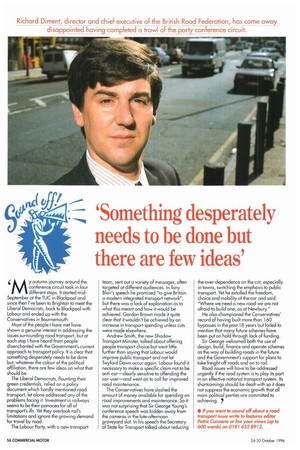'Something desperately needs to be done but there are few ideas'
Page 58

If you've noticed an error in this article please click here to report it so we can fix it.
4 y autumn journey around the
conference circuit took in four different stops. It started midSeptember at the TUC in Blackpool and since then I've been to Brighton to meet the Liberal Democrats, back to Blackpool with Labour and ended up with the Conservatives in Bournemouth.
Most of the people I have met have shown a genuine interest in addressing the issues surrounding road transport, but at each stop I have heard from people disenchanted with the Government's current approach to transport policy. It is clear that something desperately needs to be done but, whatever the colour of the political affiliation, there are few ideas on what that should be.
The Liberal Democrats, flaunting their green credentials, relied on a policy document which hardly mentioned rood transport, let alone addressed any of the problems facing it. Investment in railways seems to be their panacea for all of transport's ills. Yet they overlook rail's limitations and ignore the growing demand for travel by road.
The Labour Party, with a new transport team, sent out a variety of messages, often targeted at different audiences. In Tony Blair's speech he promised "to give Britain a modern integrated transport network", but there was a lack of explanation as to what this meant and how it would be achieved. Gordon Brown made it quite clear that it wouldn't be achieved by an increase in transport spending unless cuts were made elsewhere.
Andrew Smith, the new Shadow Transport Minister, talked about offering people transport choice but went little further than saying that Labour would improve public transport and not let Twyford Down occur again. Labour found it necessary to make a specific claim not to be anti-car—clearly sensitive to offending the car-user—and went on to call for improved road maintenance.
The Conservatives have slashed the amount of money available for spending an road improvements and maintenance. So it was not surprising that Sir George Young's conference speech was hidden away from the cameras in the late-afternoon graveyard slot. In his speech the Secretary of State for Transport talked about reducing the over-dependence on the car, especially in towns, switching the emphasis to public transport. Yet he extolled the freedom, choice and mobility of the car and said: "Where we need a new road we are not afraid to build one, as at Newbury." He also championed the Conservatives' record of having built more than 160 bypasses in the past 1 8 years but failed to mention that many future schemes have been put on hold through lack of funding. Sir George welcomed both the use of design, build, finance and operate schemes as the way of building roads in the future and the Government's support for plans to take freight off roads and on to rail. Road issues will have to be addressed urgently if the road system is to play its part in an effective national transport system. Its shortcomings should be dealt with so it does not suppress the economic growth that all main political parties are committed to achieving.




















































































































